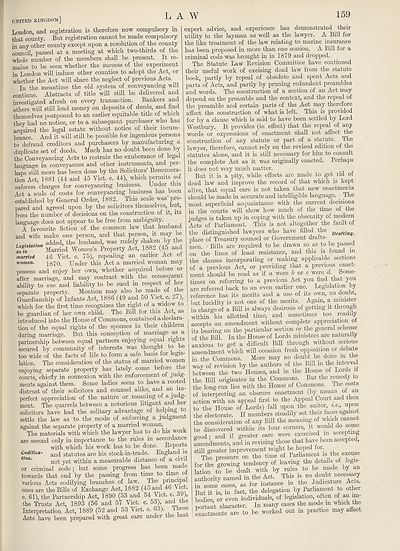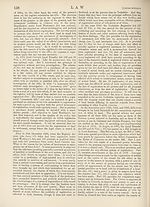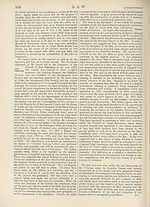New volumes of the Encyclopædia Britannica > Volume 30, K-MOR
(183) Page 159
Download files
Complete book:
Individual page:
Thumbnail gallery: Grid view | List view

UNITED KINGDOM]
LAW
159
London, and registration is therefore now compulsory in
that county. But registration cannot be made compulsory
in any other county except upon a resolution of the county
council, passed at a meeting at which two-thirds of the
whole number of the members shall be present. It re¬
mains to be seen whether the success of the experiment
in London will induce other counties to adopt the Act, or
whether the Act will share the neglect of previous Acts. _
In the meantime the old system of conveyancing will
continue. Abstracts of title will still be delivered and
investigated afresh on every transaction. Bankers and
others will still lend money on deposits of deeds, and find
themselves postponed to an earlier equitable title of which
they had no notice, or to a subsequent purchaser who has
acquired the legal estate without notice of their incum¬
brance. And it will still be possible for ingenious persons
to defraud creditors and purchasers by manufacturing a
duplicate set of deeds. Much has no doubt been done by
the Conveyancing Acts to restrain the exuberance of legal
language in conveyances and other instruments, and per¬
haps still more has been done by the Solicitors’ Remunera¬
tion Act, 1881 (44 and 45 Yict. c. 44), which permits ad
valorem charges for conveyancing business. Under this
Act a scale of costs for conveyancing business has been
established by General Order, 1882; _ This scale was pre¬
pared and agreed upon by the solicitors themselves, but,
from the number of decisions on the construction of it, its
language does not appear to be free from ambiguity.
A favourite fiction of the common law that husband
and wife make one person, and that person, it may be
.... added, the husband, was rudely shaken by the
Lasgto Married Women’s Property Act, 1882 (45 and
married 46 Viet. c. 75), repealing an earlier Act of
women. 1870. Under this Act a married woman may
possess and enjoy her own, whether acquired before oi
after marriage, and may contract with the consequent
ability to sue and liability to be sued in respect of hei
separate property. Mention may also be made of the
Guardianship of Infants Act, 1886 (49 and 50 Viet. c. 2/),
which for the first time recognizes the right of a widow to
be guardian of her own child. The Bill for this Act, as
introduced into the House of Commons, contained a declara¬
tion of the equal rights of the spouses in their children
during marriage. But this conception of marriage as a
partnership between equal partners enjoying equal rights
secured by community of interests was thought to be
too wide of the facts of life to form a safe basis for legis¬
lation. The consideration of the status of married women
enjoying separate property has lately come before the
courts, chiefly in connexion with the enforcement of judg¬
ments* against them. Some ladies seem to have a rooted
distrust of their solicitors and counsel alike, and an im¬
perfect appreciation of the nature or meaning of a J u g
ment. The quarrels between a notorious litigant and her
solicitors have had the solitary advantage of helping to
settle the law as to the mode of enforcing a judgment
against the separate property of a married woman. .
The materials with which the lawyer has to do his work
are second only in importance to the rules in accordance
with which his work has to be done. Reports
Codifica- and statutes are his stock-in-trade. England is
not yet within a measurable distance of a civil
or criminal code; but some progress has been, made
towards that end by the passing from time to time ot
various Acts codifying branches of law. The principal
ones are the Bills of Exchange Act, 1882 (45 and 4 ic .
c. 61), the Partnership Act, 1890 (53 and 54 Viet. c. 39),
the Trusts Act, 1893 (56 and 57 Viet. c. 53), and the
Interpretation Act, 1889 (52 and 53 Viet. c. 63). es®
Acts have been prepared with great care undei t e es
expert advice, and experience has demonstrated their
utility to the layman as well as the lawyer. A Bill for
the like treatment of the law relating to marine insurance
has been proposed in more than one session. A Bill for a
criminal code was brought in in 18/9 and dropped.
The Statute Law Revision Committee have continued
their useful work of excising dead law from the statute
book, partly by repeal of obsolete and spent Acts and
parts of Acts, and partly by pruning redundant preambles
and words. The construction of a section of an Act may
depend on the preamble and the context, and the repeal of
the preamble and certain parts of the Act may therefore
affect the construction of what is left. This is provided
for by a clause which is said to have been settled by Lord
Westbury. It provides (in effect) that the repeal of any
words or expressions of enactment shall not affect the
construction of any statute or part of a statute. The
lawyer, therefore, cannot rely on the revised edition of the
statutes alone, and it is still necessary for him to consult
the complete Act as it was originally enacted. Perhaps
it does not very much matter.
But it is a pity, while efforts are made to get. rid of
dead law and improve the record of that which is kept
alive, that equal care is not taken that new enactments
should be made in accurate and intelligible language. . The
most superficial acquaintance with the current decisions
in the courts will show how much of the time of the
judges is taken up in coping with the obscurity of modern
Acts of Parliament. This is not altogether the fault of
the distinguished lawyers who have filled the Dt.afting,
place of Treasury counsel or Government drafts¬
men. Bills are required to be drawn so as to be passed
on the lines of least resistance, and this is found in
the clauses incorporating or making applicable sections
of a previous Act, or providing that a previous enact¬
ment should be read as if a were 6 or c were d. Some¬
times on referring to a previous Act you find that you
are referred back to an even earlier one. Legislation by
reference has its merits and a use of its own, no doubt,
but lucidity is not one of the merits. Again, a minister
in charge of a Bill is always desirous of getting it through
within his allotted time, and sometimes too. readily
accepts an amendment without complete appreciation ot
its bearing on the particular section or the general scheme
of the BilF In the House of Lords ministers are naturally
anxious to get a difficult Bill through without serious
amendment which will occasion fresh opposition or debate
in the Commons. More may no doubt, be done m the
way of revision by the authors of the Bill m the interval
between the two Houses, and in the House of Lords i
the Bill originates in the Commons. But the remedy m
the long-run lies with the House of Commons. The costs
of interpreting an obscure enactment (by means ot an
action with an appeal first to the Appeal Court and then
to the House of Lords) fall upon the suitor, *.<?., upon
the electorate. If members steadily set their faces against
the consideration of any Bill the meaning of which cannot
be discovered within its four cornels, i JO
good ■ and if greater care were exercised m accept! g
amendments, and in revising those that have been accepted,
still greater improvement might be hoped for.
The pressure on the time of Parliament is. the excuse
for the growing tendency of leaving the details of legis¬
lation to be dealt with by rules to be made by an
authority named in the Act. This is no doubt necessary
to some cases as for instance in the Judicature Acts.
But it is in fact, the delegation by Parliament to other
bodies, o/ even individuals, of legislation, often of an im¬
portant character. In many cases the mode in which the
enactments are to be worked out in practice may affect
LAW
159
London, and registration is therefore now compulsory in
that county. But registration cannot be made compulsory
in any other county except upon a resolution of the county
council, passed at a meeting at which two-thirds of the
whole number of the members shall be present. It re¬
mains to be seen whether the success of the experiment
in London will induce other counties to adopt the Act, or
whether the Act will share the neglect of previous Acts. _
In the meantime the old system of conveyancing will
continue. Abstracts of title will still be delivered and
investigated afresh on every transaction. Bankers and
others will still lend money on deposits of deeds, and find
themselves postponed to an earlier equitable title of which
they had no notice, or to a subsequent purchaser who has
acquired the legal estate without notice of their incum¬
brance. And it will still be possible for ingenious persons
to defraud creditors and purchasers by manufacturing a
duplicate set of deeds. Much has no doubt been done by
the Conveyancing Acts to restrain the exuberance of legal
language in conveyances and other instruments, and per¬
haps still more has been done by the Solicitors’ Remunera¬
tion Act, 1881 (44 and 45 Yict. c. 44), which permits ad
valorem charges for conveyancing business. Under this
Act a scale of costs for conveyancing business has been
established by General Order, 1882; _ This scale was pre¬
pared and agreed upon by the solicitors themselves, but,
from the number of decisions on the construction of it, its
language does not appear to be free from ambiguity.
A favourite fiction of the common law that husband
and wife make one person, and that person, it may be
.... added, the husband, was rudely shaken by the
Lasgto Married Women’s Property Act, 1882 (45 and
married 46 Viet. c. 75), repealing an earlier Act of
women. 1870. Under this Act a married woman may
possess and enjoy her own, whether acquired before oi
after marriage, and may contract with the consequent
ability to sue and liability to be sued in respect of hei
separate property. Mention may also be made of the
Guardianship of Infants Act, 1886 (49 and 50 Viet. c. 2/),
which for the first time recognizes the right of a widow to
be guardian of her own child. The Bill for this Act, as
introduced into the House of Commons, contained a declara¬
tion of the equal rights of the spouses in their children
during marriage. But this conception of marriage as a
partnership between equal partners enjoying equal rights
secured by community of interests was thought to be
too wide of the facts of life to form a safe basis for legis¬
lation. The consideration of the status of married women
enjoying separate property has lately come before the
courts, chiefly in connexion with the enforcement of judg¬
ments* against them. Some ladies seem to have a rooted
distrust of their solicitors and counsel alike, and an im¬
perfect appreciation of the nature or meaning of a J u g
ment. The quarrels between a notorious litigant and her
solicitors have had the solitary advantage of helping to
settle the law as to the mode of enforcing a judgment
against the separate property of a married woman. .
The materials with which the lawyer has to do his work
are second only in importance to the rules in accordance
with which his work has to be done. Reports
Codifica- and statutes are his stock-in-trade. England is
not yet within a measurable distance of a civil
or criminal code; but some progress has been, made
towards that end by the passing from time to time ot
various Acts codifying branches of law. The principal
ones are the Bills of Exchange Act, 1882 (45 and 4 ic .
c. 61), the Partnership Act, 1890 (53 and 54 Viet. c. 39),
the Trusts Act, 1893 (56 and 57 Viet. c. 53), and the
Interpretation Act, 1889 (52 and 53 Viet. c. 63). es®
Acts have been prepared with great care undei t e es
expert advice, and experience has demonstrated their
utility to the layman as well as the lawyer. A Bill for
the like treatment of the law relating to marine insurance
has been proposed in more than one session. A Bill for a
criminal code was brought in in 18/9 and dropped.
The Statute Law Revision Committee have continued
their useful work of excising dead law from the statute
book, partly by repeal of obsolete and spent Acts and
parts of Acts, and partly by pruning redundant preambles
and words. The construction of a section of an Act may
depend on the preamble and the context, and the repeal of
the preamble and certain parts of the Act may therefore
affect the construction of what is left. This is provided
for by a clause which is said to have been settled by Lord
Westbury. It provides (in effect) that the repeal of any
words or expressions of enactment shall not affect the
construction of any statute or part of a statute. The
lawyer, therefore, cannot rely on the revised edition of the
statutes alone, and it is still necessary for him to consult
the complete Act as it was originally enacted. Perhaps
it does not very much matter.
But it is a pity, while efforts are made to get. rid of
dead law and improve the record of that which is kept
alive, that equal care is not taken that new enactments
should be made in accurate and intelligible language. . The
most superficial acquaintance with the current decisions
in the courts will show how much of the time of the
judges is taken up in coping with the obscurity of modern
Acts of Parliament. This is not altogether the fault of
the distinguished lawyers who have filled the Dt.afting,
place of Treasury counsel or Government drafts¬
men. Bills are required to be drawn so as to be passed
on the lines of least resistance, and this is found in
the clauses incorporating or making applicable sections
of a previous Act, or providing that a previous enact¬
ment should be read as if a were 6 or c were d. Some¬
times on referring to a previous Act you find that you
are referred back to an even earlier one. Legislation by
reference has its merits and a use of its own, no doubt,
but lucidity is not one of the merits. Again, a minister
in charge of a Bill is always desirous of getting it through
within his allotted time, and sometimes too. readily
accepts an amendment without complete appreciation ot
its bearing on the particular section or the general scheme
of the BilF In the House of Lords ministers are naturally
anxious to get a difficult Bill through without serious
amendment which will occasion fresh opposition or debate
in the Commons. More may no doubt, be done m the
way of revision by the authors of the Bill m the interval
between the two Houses, and in the House of Lords i
the Bill originates in the Commons. But the remedy m
the long-run lies with the House of Commons. The costs
of interpreting an obscure enactment (by means ot an
action with an appeal first to the Appeal Court and then
to the House of Lords) fall upon the suitor, *.<?., upon
the electorate. If members steadily set their faces against
the consideration of any Bill the meaning of which cannot
be discovered within its four cornels, i JO
good ■ and if greater care were exercised m accept! g
amendments, and in revising those that have been accepted,
still greater improvement might be hoped for.
The pressure on the time of Parliament is. the excuse
for the growing tendency of leaving the details of legis¬
lation to be dealt with by rules to be made by an
authority named in the Act. This is no doubt necessary
to some cases as for instance in the Judicature Acts.
But it is in fact, the delegation by Parliament to other
bodies, o/ even individuals, of legislation, often of an im¬
portant character. In many cases the mode in which the
enactments are to be worked out in practice may affect
Set display mode to:
![]() Universal Viewer |
Universal Viewer | ![]() Mirador |
Large image | Transcription
Mirador |
Large image | Transcription
Images and transcriptions on this page, including medium image downloads, may be used under the Creative Commons Attribution 4.0 International Licence unless otherwise stated. ![]()
| Encyclopaedia Britannica > New volumes of the Encyclopædia Britannica > Volume 30, K-MOR > (183) Page 159 |
|---|
| Permanent URL | https://digital.nls.uk/193569880 |
|---|
| Attribution and copyright: |
|
|---|---|
| Shelfmark | EB.18 |
|---|---|
| Description | Ten editions of 'Encyclopaedia Britannica', issued from 1768-1903, in 231 volumes. Originally issued in 100 weekly parts (3 volumes) between 1768 and 1771 by publishers: Colin Macfarquhar and Andrew Bell (Edinburgh); editor: William Smellie: engraver: Andrew Bell. Expanded editions in the 19th century featured more volumes and contributions from leading experts in their fields. Managed and published in Edinburgh up to the 9th edition (25 volumes, from 1875-1889); the 10th edition (1902-1903) re-issued the 9th edition, with 11 supplementary volumes. |
|---|---|
| Additional NLS resources: |
|

